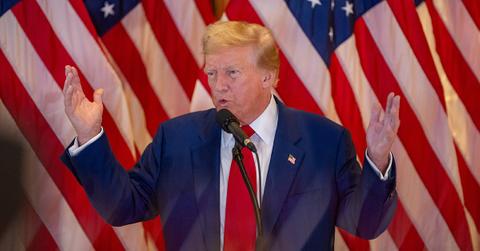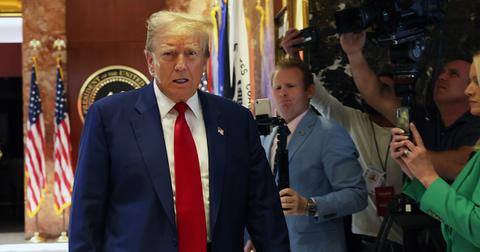Donald Trump Is a Convicted Felon — Can He Still Run for President?
Despite being a convicted felon 34 times over, Donald Trump can still run for president. He meets all three of the requirements.
May 31 2024, Published 1:47 p.m. ET

Following a trial that received extensive media coverage, Donald Trump has been convicted of 34 counts of falsifying business records. The news that Trump had been convicted and is now a felon naturally led many to wonder what the implications of this conviction might be for him.
Even as he was standing trial, Trump is also actively running for the presidency four years after he was defeated by Joe Biden. In the wake of this conviction, here's what we know about whether he can still run for president.

Can Donald Trump still run for president?
Even though he is now a convicted felon 34 times over, Donald Trump can still run for president. There is nothing in the law or the Constitution that says that a criminal can't run for and be elected president.
To run for president, all you need to be is a natural-born U.S. citizen, 35 years old, and have resided in the U.S. for at least 14 years. Trump meets all three of those requirements.
There is also a requirement in the 14th Amendment stating that no one who has committed insurrection against the U.S. is allowed to run for office, but the Supreme Court ruled in 2024 that that provision can only be enforced through legislation in Congress. Trump probably did commit insurrection, but that provision seems unlikely to bar him from running for president in the 2024 election.
Trump may face other restrictions.
Although Trump isn't barred from running for president, the conviction may mean that he faces other restrictions on his mobility. While it's far from guaranteed that he will face jail time when he is sentenced on July 11, jail would obviously keep him from campaigning if he was incarcerated leading up to election day (which isn't a certainty even if he is sentenced to jail time).
It's also possible that Trump could be sentenced to probation, which usually comes with restrictions on who you can associate with and how freely you can move across state lines. It isn't clear what the details of Trump's probation might look like, but he very well could face it after his sentencing.
Until he's officially sentenced in July, though, Trump has been freed on his own recognizance, which means that he can move freely across the country and earnestly campaign in a way he hasn't been able to do in recent weeks because of the trial.
It seems likely that Trump will make the most of this interval to rally his supporters, many of whom will still vote for him even though he was convicted by a jury of his peers.
How this conviction may change the minds of voters is yet to be determined, but the fact will remain that Trump is now a convicted felon. Even if he is elected to the White House, because he was convicted in state court, he will likely remain a felon. He'll simply be both a convicted criminal and the president of the United States.